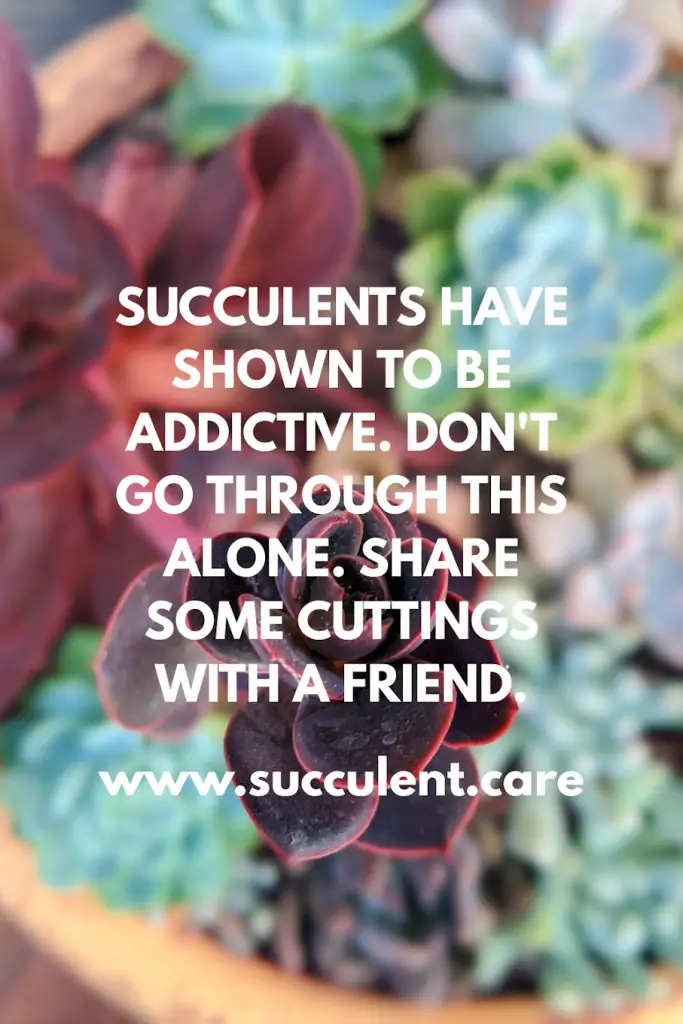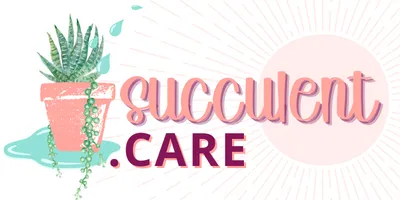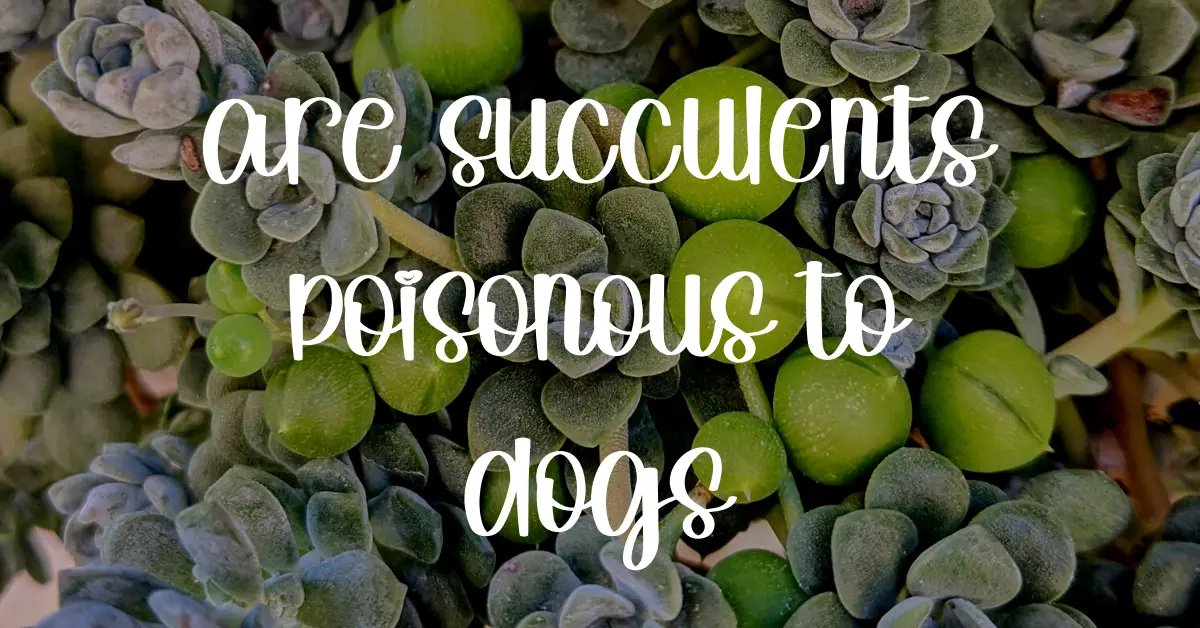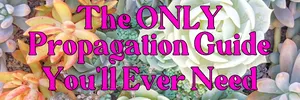Succulents are popular plants for their low maintenance and unique appearance, but are they safe for pets? In this article, we’ll answer the question of whether succulents are poisonous to dogs and what to do if your pet ingests a succulent plant.

Are Succulents Poisonous to Dogs, Cats or Humans?
The short answer is that some succulents are poisonous to dogs, cats and humans while others are not. It’s important to note that every species is different and may have different reactions to different plants, so it’s always a good idea to err on the side of caution.
You might like: How to Repot Succulents

Some common succulent plants that are poisonous to dogs, cats and humans include aloe vera, cactus, and jade plant. These plants contain toxins that can cause vomiting, diarrhea, and other digestive issues in dogs, cats and humans.
5 Succulents That Are Poisonous to Cats
- Aloe vera – The gel inside aloe vera leaves can cause vomiting and diarrhea in cats if ingested. The spines on the leaves can also cause injury to the mouth and digestive tract.
- ‘Jade Plant’ ‘Crassula ovata – Ingestion of jade plant can cause vomiting, lethargy, and depression in cats. The leaves are the most toxic part.
- ‘Snake Plant’ or ‘Mother-in-Law’s Tongue’ Sansevieria trifasciata – All parts of the snake plant are toxic to cats and can cause nausea, vomiting, and diarrhea if ingested.
- ‘ZZ ‘Plant’ Zamiifolia – The leaves and stems of ZZ plants contain a toxin called calcium oxalate that can cause vomiting, difficulty breathing, and pain in the mouth and throat if ingested by cats.
- ‘String of Dolphins’ (Senecio peregrinus) – This succulent can cause skin irritation if touched and if ingested it can cause nausea, vomiting, and diarrhea in cats.

4 Succulents That Are Safe For Cats
Yes, there are some succulents that are considered safe for cats and less poisonous. Some good options include:
- Haworthia – These succulents have low toxicity and are relatively safe for cats. They have mild spikes along the leaves that can cause minor irritation but are not poisonous if ingested in small amounts.
- Echeveria – Echeveria succulents are considered non-poisonous to cats and have colorful rosette-shaped leaves. They are safe to have in the home and around cats.
- Sempervivum or Hens and Chicks – These succulents are non-toxic to cats and safe to have in the home. They produce small red and purple flowers that are also non-toxic.
- Sedum – There are many types of sedum succulents that are safe for cats, including burro’s tail, dragon’s blood, and autumn joy. They are non-toxic and their leaves are soft and non-spiny, minimizing risk of irritation.
You might also like: https://www.aspca.org/pet-care/animal-poison-control/cats-plant-list
5 Succulents That Are Poisonous To Dogs
- Euphorbia milii ‘Crown of Thorns’ – This succulent contains a toxic sap that can cause vomiting, drooling, and mouth pain if ingested by dogs.
- Kalanchoe tomentosa ‘Panda Plant’ – All parts of the panda plant are toxic to dogs and can cause vomiting, diarrhea, and heart arrhythmias if ingested.
- Senecio herreianus ‘String of Watermelons’ – This succulent contains toxins that can cause vomiting and diarrhea in dogs if ingested. The small bean-like leaves pose a choking hazard as well.
- Crassula argentea ‘Money Plant’ – The leaves of the money plant succulent are toxic to dogs and can cause vomiting, diarrhea, and depression if ingested.
- Echinocactus grusonii ‘Golden Barrel Cactus’ – Although less poisonous than other cacti, the golden barrel cactus can still cause mouth irritation and vomiting in dogs if the spines are ingested or puncture the mouth. The pulp and seeds are the most poisonous parts.
5 Succulents That Are Not Poisonous to Dogs
- Aeonium
- Echeveria
- Haworthia
- Sempervivum ‘Hens and Chicks’
- Schlumbergera ‘Christmas cactus’
- Opuntia ‘Prickly Pear Cactus’ Non-toxic but the spines will obviously hurt!
These succulents are considered non-toxic to dogs and safe to have in homes with pets. However, it’s still best to keep them out of the reach of dogs to prevent chewing or other issues. With training, dogs can learn to leave these succulents alone while still enjoying them as part of your home decor.
You might also like: https://www.aspca.org/pet-care/animal-poison-control/dogs-plant-list
3 Succulents That Are Poisonous To Reptiles?
There isn’t a whole lot of information on succulents which are poisonous to reptiles, but here’s what I could find. Be on the safe side and just leave succulents out of your reptile enclosures.
- Euphorbia tirucalli ‘Sticks on Fire’ – The pencil tree succulent contains a toxic sap that can irritate the mouth and digestive tract of reptiles if ingested, causing symptoms like vomiting and diarrhea.
- Adenium obesum ‘Desert Rose’ – The desert rose succulent contains toxins that can cause vomiting, diarrhea, and heart problems in reptiles if ingested.
- Faucaria tigrina ‘Tiger’s Jaw’ – The tiger’s jaw succulent contains oxalic acid and other toxins that can irritate the mouth and digestive tract of reptiles if ingested, causing symptoms like vomiting and appetite loss.
Again, the safest approach is to keep all succulents out of the reach of reptiles. Seek veterinary care if any succulent is ingested and symptoms are observed.
Are Succulents Poisonous to Rabbits?
Several commonly known succulent plants, such as Aloe vera, ‘Jade Plant, ‘Snake Plant’, and “ZZ Plant’, contain toxic substances that can cause various symptoms, such as vomiting, diarrhea, and lethargy, in rabbits if consumed. Other examples of poisonous succulents to rabbits are ‘Panda Plant’, ‘Crown of Thorns’, ‘String of Pearls’, and Christmas cactus, which may also have spiky leaves or stems causing physical injury. To prevent any harm, its a good idea to keep all types of succulents out of reach from rabbits, and to supervise them when in the vicinity of such plants. If a rabbit ingests any succulent, seek veterinary care immediately.
While some succulents like ‘Burro’s Tail’, Sedum, Sempervivum, and Echeveria are considered safe for rabbits in small quantities, they should still be kept away from the rabbits as overconsumption can lead to gastrointestinal problems. Succulents aren’t a normal part of a rabbit’s diet anyways. It’s always better to research and confirm if a succulent is poisonous to rabbits before introducing it to their surroundings. When in doubt, it’s better to avoid a succulent that has unclear toxicity information.
Succulents That Are Poisonous in General
Senecio species, such as as ‘String of Pearls’ or ‘String of Bananas’, is a popular houseplant that is poisonous to dogs, cats and humans. The plant contains toxins called pyrrolizidine alkaloids, which can be harmful to dogs, cats and humans if ingested.

When dogs, cats or humans ingest pyrrolizidine alkaloids, they can suffer from liver damage and potentially develop liver failure. Symptoms of pyrrolizidine alkaloid poisoning in dogs, cats and humans may include vomiting, diarrhea, loss of appetite, lethargy, and yellowing of the whites of the eyes (jaundice). In severe cases, the toxins can cause damage to the blood vessels, leading to bruising and bleeding.

If you suspect that your pet or a family member has ingested Senecio or any other toxic plant, it’s important to seek medical care immediately. The treatment for pyrrolizidine alkaloid poisoning may include hospitalization, supportive care, and medications to help protect the liver and remove the toxins from the body.
It’s also a good idea to keep toxic succulents out of reach of dogs, cats and humans, as accidental ingestion can be harmful or even deadly. If you are not sure whether a plant is toxic to pets or humans, you can consult with a doctor or check with a poison control center for more information.

Euphorbia, also known as spurge, is a large plant family that includes a variety of species that are toxic to dogs, cats and humans. The toxic substances in euphorbia plants are called diterpenoid esters, which can cause a range of symptoms if ingested by dogs, cats and humans.

Symptoms of euphorbia toxicity in dogs, cats and humans may include:
- Oral irritation: The diterpenoid esters in euphorbia plants can cause irritation and inflammation of the mouth and throat, leading to drooling, vomiting, and difficulty swallowing.
- Dermal irritation: If the sap of a euphorbia plant comes into contact with a dog’s skin, it can cause irritation and inflammation. This can lead to redness, swelling, and blistering of the skin.
- Eye irritation: Euphorbia sap can also cause irritation and inflammation of the eyes, leading to redness, swelling, and discharge.
- Gastrointestinal symptoms: Ingestion of euphorbia plants can cause gastrointestinal symptoms such as vomiting, diarrhea, and abdominal pain.

Other succulents that are generally considered non-toxic to dogs, cats and humans include Echeveria and Sedum. However, it’s always a good idea to keep an eye on everyone if you have any plants in your home, just in case.

What to Do if You Suspect a Succulent Has Been Ingested
If you suspect that someone has ingested a toxic succulent, it’s important to act quickly. Call your veterinarian, doctor or the ASPCA Animal Poison Control Center at (888) 426-4435. They will be able to advise you on the best course of action based on the type of plant and the severity of the symptoms.
If there is vomiting, diarrhea, or other digestive issues, your medical professional may recommend supportive care such as fluids to help flush the toxins out and in severe cases, hospitalization may be needed.
Prevention is Key
The best way to prevent ingestion of a toxic succulent plant is to keep them out of reach. This may mean keeping your plants on a high shelf or in a room that your dogs, cats and family members don’t have access to. If you have curious creatures that like to chew on plants, it may be a good idea to avoid toxic succulents altogether and opt for non-toxic varieties instead.
How to Keep Cats From Eating Succulents
Cats are notorious for nibbling on plants, and your succulents are no exception. Here are some tips to help keep your cats from eating your succulents:
- Choose safe plants: Some succulents are toxic to cats, so it’s best to choose safe plants that won’t harm your furry friends if they do decide to nibble. Some safe succulents include echeverias, haworthias, and sedums.
- Provide cat grass: Cats love to nibble on grass, so providing them with their own cat grass can help to divert their attention from your succulents. You can find cat grass at most pet stores, or you can grow your own from seeds.
- Use repellents: There are various repellents that you can use to keep cats away from your succulents. Some options include citrus peels, coffee grounds, and vinegar. You can also buy commercial cat repellents that are safe for plants.
- Create barriers: You can create physical barriers around your succulents to prevent cats from getting to them. This can include placing rocks or pine cones around the base of the plant, or using chicken wire to create a cage around the plant.
- Train your cat: You can train your cat to stay away from your succulents by using positive reinforcement. When your cat shows interest in a plant that you don’t want them to eat, redirect their attention to a toy or treat that they enjoy.
Additional steps to prevent dogs, cats and humans from eating toxic succulents:
- Keep toxic succulents out of reach: Keep toxic plants out of reach of dogs by placing them on high shelves, in closed cabinets, or in a room that is not accessible to pets.
- Use plant covers: If you have toxic succulents in your yard, you can use plant covers or wire mesh to prevent dogs from accessing them.
- Use bittering agents: Some commercial products contain bittering agents that can make plants taste unpleasant to dogs. You can apply these products to the leaves of toxic plants to discourage dogs from chewing on them.
- Use plant identification guides: Familiarize yourself with common toxic succulents so that you can identify and remove them from your home or yard. You can find lists of toxic succulents online or in plant identification guides.
- Educate others: If you have friends or family members who also have pets, educate them about toxic succulents and encourage them to take steps to prevent their pets from accessing them.
Succulents can be toxic to dogs, cats and humans, so it’s important to be aware of which types of plants are safe for you and your animals. If you suspect that a toxic succulent has been ingested, call your doctor, veterinarian or the ASPCA Animal Poison Control Center for advice. By taking precautions and keeping toxic succulents out of reach, you can help keep your dogs, cats and humans safe and healthy.

Where to Buy Succulents Online


